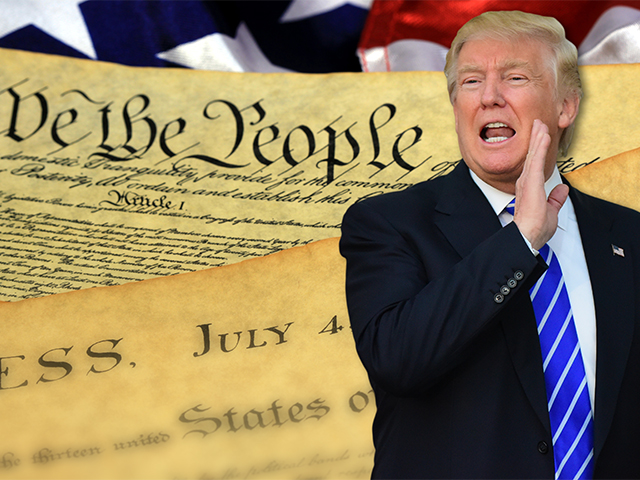
In coup attempt Number VI, liberal lawyers and their journalistic allies now turn to the XXV Amendment for their desperate desire to overturn the elections and deny democracy in the United States. First, they tried recounts; that gave Trump more votes than he had before and exposed likely Democratic voter fraud in Detroit. Next up, they tried an electoral college coup, littered with lawsuits and public petition drives. That resulted in Hillary losing more electoral votes than Trump. Third, they brainstormed an actual CIA coup, with Foreign Policy writers talking of a “military coup,” succeeded by leaked intelligence reports and calls for the “deep state” to “take over.” That resulted in a criminal investigation of the illegal leakers and the firings of untrusted staff, clearing the way for more Trump support within the government. Fourth, they wanted impeachment, until they realized that was helping Trump supporters rally to Trump and the GOP. Fifth, came calls for treason prosecutions, until they realized they didn’t even know what the law of treason was, and that it isn’t actually available to just criminalize someone for beating your candidate in an election. Now, we have the sixth sad, pitiful attempt, again based on historically-fabricated interpretations of the law and fictionalized political expectations: have the Cabinet and both branches of Congress lie, and declare Trump incapacitated. No less than Nicholas Kristof advances this notion in the New York Times, aided and abetted, of course, by the law “scholar” Laurence Tribe, who converted his Constitutional Law class at Harvard this semester to a class in the law of conning liberals. Like the last five attempts to take out Trump, this sixth attempt is as legally ludicrous and politically ill-fated as the first five embarrassing failures. And, liberals, you might want to take note: what doesn’t take out Trump, makes Trump stronger.
The actual procedural protocol for the XXV Amendment requires three actors to agree the President is legally incapacitated against the President’s will: first, the Vice-President must declare the President incapacitated; second, a majority of the members of the cabinet must declare the President incapacitated; and third, two-thirds of both the House of Representative and the United States Senate must also concur, and declare the President incapacitated. The XXV Amendment merely provides a streamlined protocol should the president become legally incapacitated.
It is an open question whether these political actors can just declare a President incapacitated, or if the courts can review what legal standards apply to incapacity. The common law though provides meaningful guidance as to the intended meaning of the word within the Constitution. Legal incapacity requires either: death, resignation, or functional incapacity. Functional incapacity is made clear by the verbiage chosen for the XXV Amendment: the President must be “unable to discharge the powers and duties of his office.” The XXV Amendment later refers to this as “inability” in its entirety. In the law, this is known as “incapacity.”
As lawyers, the question of incapacity is dealt with all the time in the law, especially in cases of the infirm or elderly, rape cases or statutes of limitations, criminal culpability or civil liability. Due equally to the respect for the individual and regard for democracy, we do not allow the state, or anyone else, to uniformly call some incapacitated without clear, constricting standards. This requires the literal inability to function — coma status, or its equivalent, generally. A mental illness so severe it deprives a person from being able to feed themselves, house themselves, etc. There must be a complete inability to provide for the most basic needs of themselves. The criminal law provides further detailed definitions, such as when a defendant is competent to stand trial. To be incompetent or incapacitated, as any lawyer knows, compels a very high standard of proof of completely inability to function.
In short, in order to declare a President incapacitated, you would need to be able to prove they would be placed in guardianship, not capable of being held liable civilly or criminally responsible, and incapable of making the most elemental decisions of their own contracts or oaths. For example, John McCain might be “nuts” from plenty of political perspectives; but he’s not “nuts” in terms of the law. In fact, liberal prior theories for attacking Trump — the perceived deliberation and intentionality of his actions — immediately disproves any claim of “incapacity.” This is the kind of half-wit logic bad coup-plotters think up in third-rate novels of the kind journalists write in their spare time.
Guess what liberals? Disagreement with a president is not grounds for calling him “incapacitated,” just like Trump trumping Hillary in the election does not equal “treason,” just like electors ignoring their oaths to overturn an election is not “democracy,” and just like supporting CIA coups in the deep state is not “American.”
This attempt to divorce the law from its common terms and intended actions embarrasses the profession of both law and journalism, demeaning and disparaging the perceived objectivity of the liberal professional class, replacing it with what reads like a self-satire scripted from the tweets of a troll. The same word encapsulates both liberal coup theories against Trump and the capacity of liberals for the employment of objective logic in the era of Trump: “incapacitated.”
This is an opinion piece. The views expressed in this article are those of just the author.